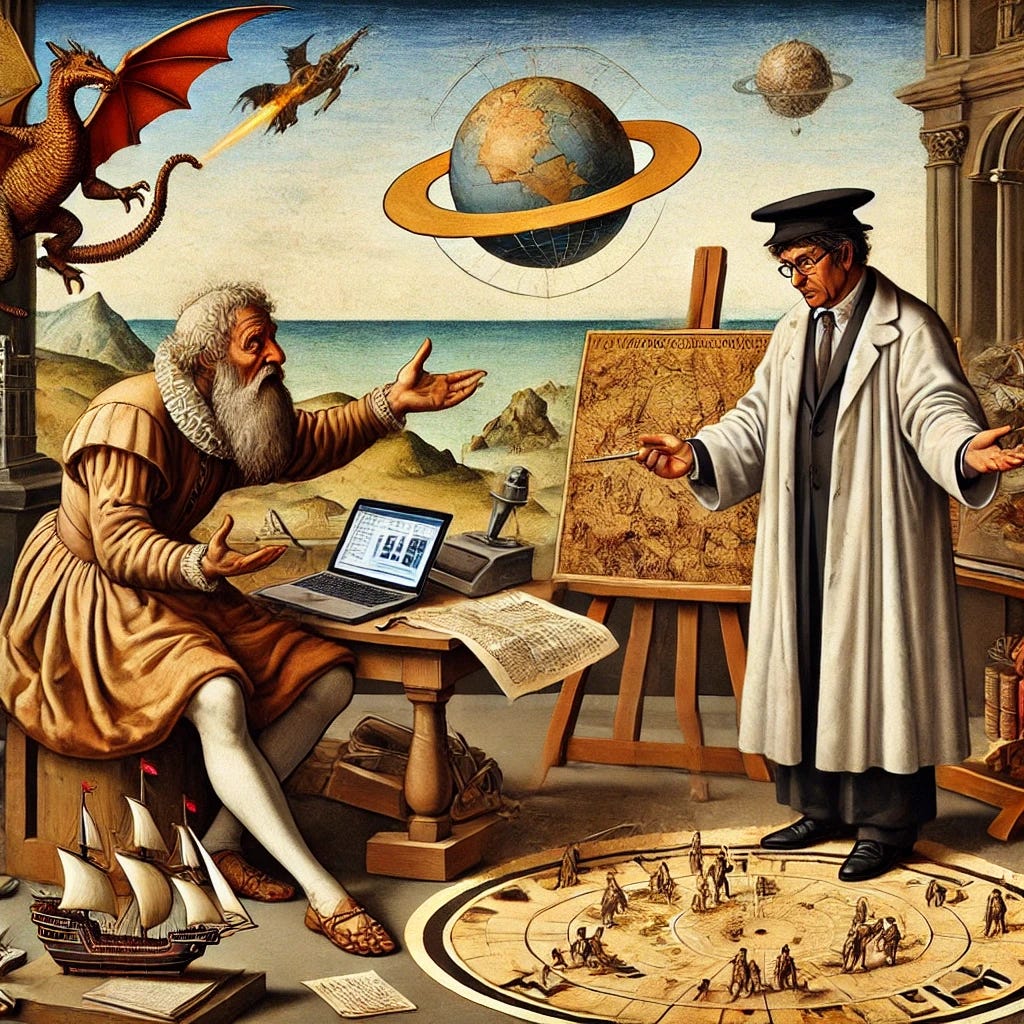There have been a lot of things we thought we knew.
These things have been overwhelming in number, but they came in a few distinct categories.
There were the things we thought about how everything works. This is a big category we now call physics, which originally meant nature. “Nature” was not just Bob Ross-style nature, either, but instead referred to the true nature of reality.
For a long time, we thought the Sun circled around the Earth, just like everything else out there. Right up until Galileo could see a bit farther, Copernicus’s idea that the Earth wasn’t actually at the center was still pretty fringe.
It’s really hard to overstate how revolutionary this idea was: for the first time, we no longer believed ourselves to be at the center of the entire cosmos. This understanding challenged other things we thought, many of which were based on this anthropocentric idea.
For instance, we thought there were animal spirits that gave all animals the ability to move, but this vital force turned out to be electricity. If humans weren’t at the center, and life itself could be explained through careful observation, other ivory towers were destined to fall quickly, and that’s what happened.
We thought Newton was spot-on in his description of how gravity worked, but it turned out that the universe works in a relativistic manner, meaning that the amount of time that passes (among other things) depends on who you ask. We’ve been wrapping our brains around that one ever since, building GPS satellites that prove relativity every day, and using smartphones that rely on these principles to function.
We thought light was made up of waves, but it’s really made up of particles… and waves. Two thousand three hundred years earlier, Plato had hinted that there might be some reality beyond what we could see in his Allegory of a Cave, but nobody ordered this version of reality, to paraphrase Isidor Isaac Rabi (Who ordered that?!?).
Then, there are more recent things we thought. These are things that are recent enough to be in living memory for most folks, and you’ve probably heard some of these falsies during your lifetime.
There’s the idea that microwaves cook from the inside out, something I certainly thought as a kid. I also used to think that cracking your knuckles gives you arthritis, but now I know better (and I’m still cracking every day!).
Bakers’ Chocolate isn’t named after bakers, and German chocolate cake isn’t named after Germans. Tattoos go back 5000 years or more, not just a few decades, as kids my age growing up in the American South probably believed. The oldest computer is actually 2000 years old.
We used to think that farming was necessary in order to have monumental structures, but Göbekli Tepe completely debunks this idea. I certainly grew up with this idea about farming and building.
Vikings did not wear horned helmets, and I’m relieved to report that English lords were not actually awarded prima nocte as shown in Braveheart:
Medieval Misinformation
The medieval period in Europe begins with the official fall of the Western Roman Empire in the year 476, at least according to most historians.
In history, the victor gets to write down what happened and then tell everyone about it, so it pays to take this particular lens into account. It’s our job to consider the totality of the historical narrative, not just what was written down by the winners, who no doubt want to make sure they’re remembered as reverently as possible.
Hammurabi’s Stele paints him as one of history’s most magnanimous rulers, giving limitations to his own power, something still present in the United States Constitution today. No one is above the law, he generously claims in his proclamation, but let’s keep in mind that Hammurabi was also a politician who had to remain in power, and he’s the one who got to create this record in the first place. Was he really bound by his own law?
Beyond history, there are the things we’ve thought about ourselves. These are almost always limitations we’re wrong about.
For the longest time, we thought no human being could possibly run a mile in under 4 minutes. Robert Bannister first eked under this barrier in 1954 with his finish at three minutes and fifty-nine seconds. Now, the fastest runners aim for times in the 3:45 range.
If this one seems utterly arbitrary and silly, the hurdle Chuck Yeager cleared seemed insurmountable. Yet Yeager shattered the sound barrier repeatedly himself, breaking his own records and the records of other pilots as the new frontier quickly moved to Mach 2 and beyond:
Breaking Barriers
As Yeager throttled the plane ever faster, approaching and then passing 500 and then 600 miles per hour, the Bell X-1 began to shake and rattle on the inside.
Whenever I hear someone say “we will never know” or “we’ll never do that”, my hackles go up instantly.
We’ll never know how long ago this person lived, we might have said before carbon dating came along, so now we know. We’ll never know this ancient language, historians and anthropologists claimed, until Napoleon shook things up by uncovering the Rosetta Stone.
We’ll never land on the moon. We’ll never decode the human genome. Nobody will ever live past 120 years old. We’ll never build tiny robots that are small enough to swim around inside your body.
Never is an awfully long time, and we humans have an excellent track record of smashing barriers.
Are there any of these sorts of things that you used to think you knew? You can go as far back as Santa if you want, but I’m especially interested to hear about any things from your own life you’ve been surprised to find an answer for. What things did we think we know that you think we should talk about today?







I used to think all liquids contained water
Nanoprobes!